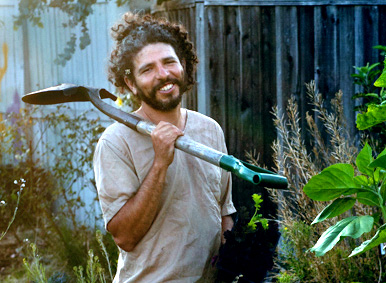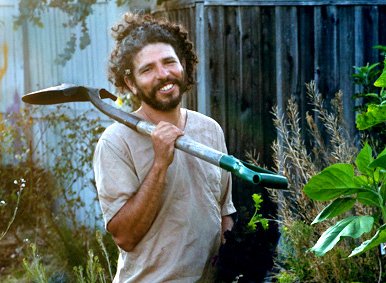
Grist is proud to present the Change Gang — profiles of people who are leading change on the ground toward a more sustainable society and a greener planet. Some we’ve written about before; some are new to our pages. Some you’ll have heard of; most you probably won’t. Know someone we should add to the Change Gang? Tell us why.
There is dirt underneath Max Cadji’s fingernails seven days a week, and that’s exactly how he likes it. Whether he’s spending the day sifting worm compost in his job managing an urban farm for Oakland, Calif.’s People’s Grocery, or helping to set up a community garden through Phat Beets Produce, a “food justice collective” he co-founded, Cadji is outdoors, every day, pouring his “sweat equity” into projects he believes in.
He’d be doing the same work, he says, whether or not his job at People’s Grocery was paying his bills. “This is a movement,” says Cadji, “and when you’re doing movement-building, there is no disconnection between your free time and your work time. If I stopped getting paid, right now, I have money saved, and I’d continue doing the work until another means came along. It’s just basically what I think about all day and what I talk about all day — there is no need for me to make time for it because there is no differentiation between work and pleasure.”
The way Cadji sees it, there’s also not much difference between the southern tip of Madagascar and the flatlands of West Oakland. In both cases, the indigenous locals are at the untender mercies of a global food system that doesn’t have their best interests at heart.
In Madagascar, where Cadji spent three years in the Peace Corps working on a project to reintroduce sorghum, Western aid organizations were pushing non-traditional corn and other imported food items that made it impossible for local farmers to sell their own produce profitably. Meanwhile, in West Oakland, finding the capital to invest in a grocery store specializing in locally grown, healthy food is an uphill battle, but if you need a liquor store or fast food joint, there’s one on practically every corner.
“In Madagascar, I would see a family scooping peas out of a bag that was sent by the World Food Program as a gift from the United States,” says Cadji, “and at the same time I would see farmers bringing their fresh peas from the countryside, and they weren’t able to compete with the food that was being dumped on the local market. I saw the people I was working with suffer at the hands of my own government, and it really clicked for me that everyone knows how to produce food but there’s a lot of politics that is keeping people hungry. So that’s how I became introduced to the idea of food sovereignty: local people having the ability to control their own food systems, free from outside organizations, free from government, free from NGOs and the world market.”
“I really wanted to work on creating equitable food systems,” adds Cadji, “that figured out a way to bring really small farmers, and local farmers of color, into a community that reflects them, a community that is often left out of what we call the good food movement or the slow food movement.”
Cadji grew up in Las Vegas and Los Angeles, “in a very suburban atmosphere, so I really didn’t get much connection to urban food production, greenery, or landscaping.” After getting a degree in environmental horticulture at the University of California-Davis and doing his Peace Corps stint, he moved to the San Francisco Bay Area, with its hotbed of food justice activism and urban gardening initiatives.
But the profusion of socially minded nonprofits carries its own problems. Everybody is running after the same grant money, says Cadji, and too much of that money ends up paying cushy salaries to management positions, rather than directly helping the residents of the communities that the nonprofits are ostensibly targeting. At Phat Beets, Cadji and his fellow volunteers are attempting to do an end-run around this problem by doing the backend work — payroll, insurance, website design, and so forth — for free while paying a decent living wage to the workers who are actually digging gardens, delivering produce, and keeping the earthworms happy.
“We wanted to see what happens if you do something totally different, and create a structure where you put the power back in the hands of the people who are affected by a problem, and make sure that they get paid first.”
Ultimately, Cadji hopes to escape the chains of what he calls the “philanthro-pimp” model of grant-funded nonprofits and create self-sustaining businesses tied to food production. His work raising worms at People’s Grocery is one example. Vermiculture is taking off all over the Bay Area, he says; right now, demand for worms is far outpacing supply.
“I can’t keep up,” he laments. But a listener can hear between the lines: That’s a good problem to have, and all the more reason to get some more dirt under his fingernails. Local worms, local compost, local farming — it all adds up, eventually, to “liberation from the nonprofit industrial complex” and healthier food for everyone.




